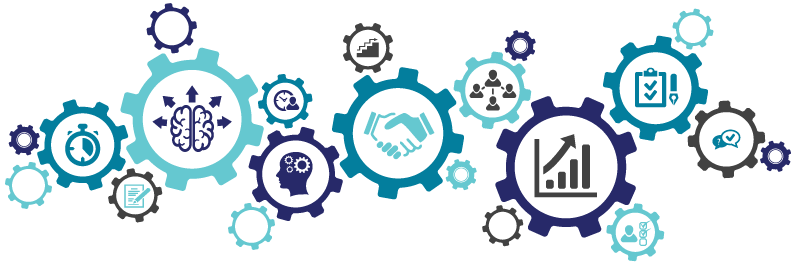January is around the corner and most individuals are reviewing their professional goals and development plans for the coming year. In the past, these annual goals may have been linear and inspired by natural paths for career progression. However, the events of the past year have made it apparent the focus should shift to more agile goals and account for a professional reality that continues to blur into personal responsibilities and home life.
Recently, I had the opportunity to hear future-of-work strategist Heather McGowan speak. For years, she has been writing on the changes happening in the working world and the importance of connecting ourselves to a sense of purpose, rather than measuring success by job titles. Additionally, becoming comfortable with ambiguity and vulnerability is key in order to learn and adapt at a rapid pace. This is perhaps more important than ever before, as individuals work to set meaningful goals for the new year, in an uncertain and volatile time.
While goal setting likely looks different this year, there are a few areas you can focus on to grow transferable skills and prepare for whatever 2021 has in store.

Be forward-thinking.
How can you use this year to best set yourself up for a largely unknown future? Embrace continual learning and upskilling, rather than titles and seniority. Perhaps this is the year you seek out mentors and spend time positioning yourself for a future next step. How can you build better relationships with key individuals in your company? Is there a way you can help create organization-wide impact, such as volunteering for emerging committees? Which of your previous longer term goals need to be adjusted to remain relevant? Be creative and innovative while looking for areas of opportunity the past year has created.

Focus on soft skills.
Perhaps last year you had plans to take additional exams, build your credentials or spearhead new projects. While this is still possible, focusing on soft skills is also vital for career success in 2021. The past year introduced many of us to a completely virtual working world. Zoom meetings became the norm and impromptu hallway conversations were nonexistent. Being able to build working relationships in the remote environment is no longer optional. Even as individuals begin to return to the office, remote interactions will remain frequent and the ability to effectively communicate through a screen and via written communication is vital.
Incorporate ways to build soft skills into your 2021 goals. This could include honing your active listening skills, emotional intelligence, leadership skills and more. Seek out feedback from trusted colleagues and mentors to consider the best way to strengthen these skills. Sit in on virtual meetings with those who have mastered specific skills, read relevant books or ask for feedback from colleagues. Work with your manager, mentors and others in your professional network to determine the skills that will have the largest impact in your current role and the ones you’ll need to master to advance.
Build a plan around productivity.
 Now that we’re adjusting to the next normal, reevaluate how you can be most productive moving forward. If you focus best at night, with no distractions, but need the mornings to get your kids situated in online learning, bring it up to your manager. Perhaps there is a way to adjust your hours or flex your schedule so you can be most effective. If you are having difficulty with your internet connection or would benefit from multiple screens, don’t hesitate to be your own advocate and ask for the resources that will enable you to be most productive.
Now that we’re adjusting to the next normal, reevaluate how you can be most productive moving forward. If you focus best at night, with no distractions, but need the mornings to get your kids situated in online learning, bring it up to your manager. Perhaps there is a way to adjust your hours or flex your schedule so you can be most effective. If you are having difficulty with your internet connection or would benefit from multiple screens, don’t hesitate to be your own advocate and ask for the resources that will enable you to be most productive.
How are you setting yourself up for success at the beginning of your day? If back-to-back meetings aren’t possible with young children at home, build breaks into your calendar. Schedule specific project time during the day to ensure you’re able to hit important deadlines, rather than letting less vital meetings fill your calendar. Determine how long you can focus and be effective before taking a break, and then schedule time to walk away for a few minutes and refresh.
 Give yourself grace.
Give yourself grace.
For many of us, the first few months of the pandemic were focused simply on survival. While professionals are settling into these new routines, parents are still juggling work schedules with virtual school. Those living alone are finding ways to counteract feelings of loneliness and isolation. Some are faced with family members, friends or themselves battling health issues, while others are taking financial hits. The pandemic has impacted everyone and created a new level of authenticity and connection. Offer yourself the same grace and empathy you’ve been extending to others.
If you haven’t made the professional progress you set out to achieve at the beginning of 2020, it’s ok. Focus on your ability to adapt to change, to refocus your priorities and to help teammates move forward. Perhaps you worked long days and 50-60 hour weeks prior to the pandemic. If that’s not possible now, know that you are doing your best and make the most of the hours you are working. For many, it may be important to rebuild your professional identity within the current landscape.
The coming year will offer its own set of challenges and opportunities. Take a step back as you goal-set for 2021 and consider the skills that will help you be successful and productive. Be open with your manager, ask questions, and be authentic and proactive in developing future-focused goals.